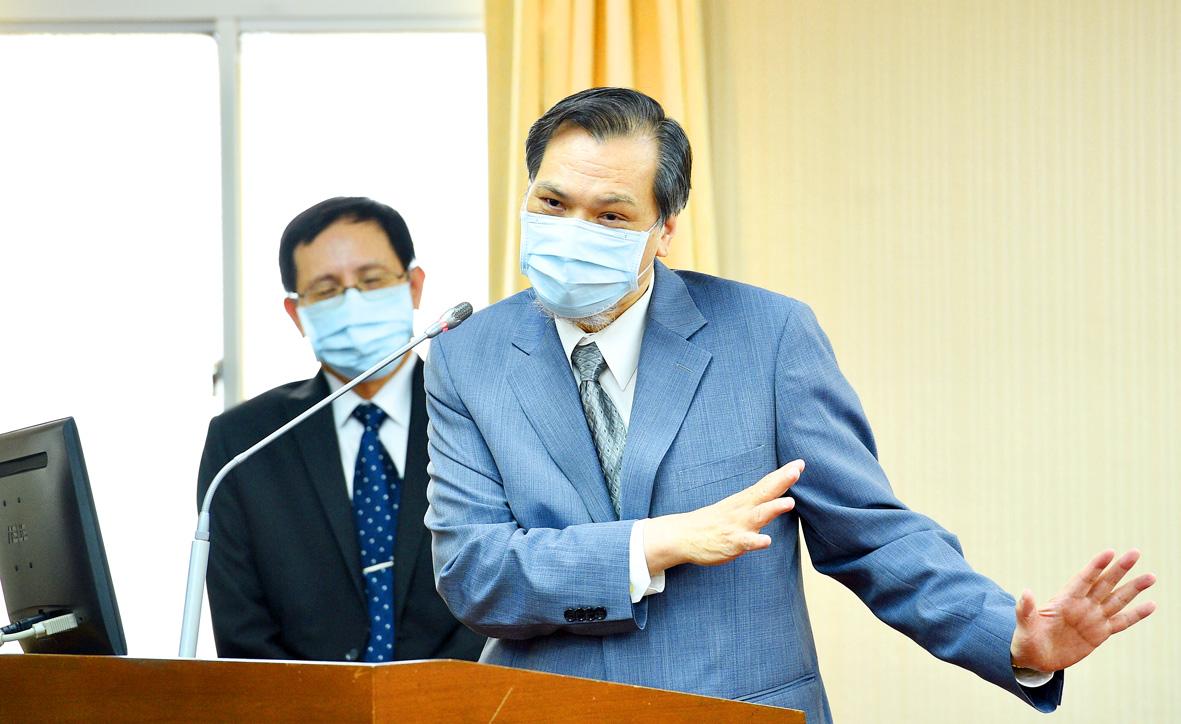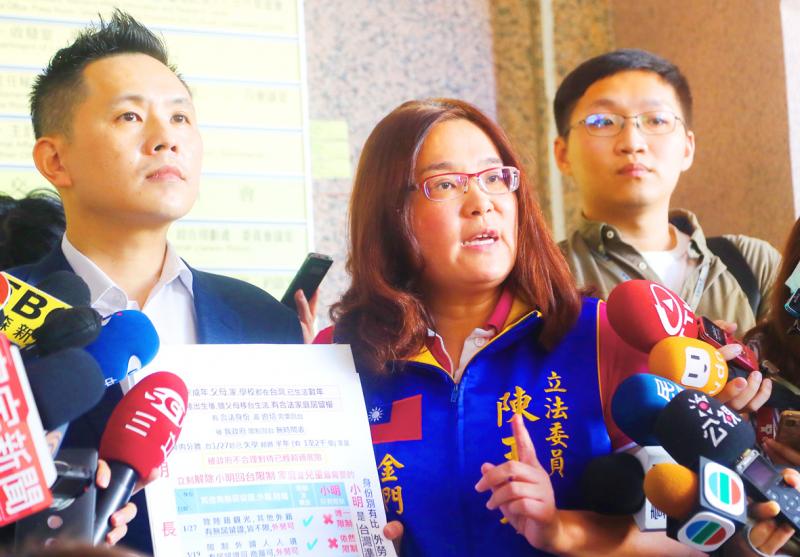The Taiwan International Student Movement yesterday said it would protest today outside the Ministry of Education in Taipei against a policy that excludes some Chinese students from returning to Taiwan amid the COVID-19 pandemic.
Since June 17, the ministry has allowed foreign students from 19 “low risk” and “medium-low risk” countries and regions to enter Taiwan.
On July 22, it announced that it was relaxing restrictions to include students from all countries and regions who are graduating this semester and on Wednesday it further expanded entry to students enrolled in degree programs.

Photo: Peter Lo, Taipei Times
A letter sent by the ministry on Wednesday to universities did not exclude students from China.
However, speaking to reporters later that day, Deputy Minister of Education Lio Mon-chi (劉孟奇) said that due to “cross-strait related” considerations, only Chinese students who are graduating this semester would be allowed to return.
The students’ group criticized the policy on Facebook, calling the exclusion of Chinese students an example of politics overriding the right to study.

Photo: CNA
Another students’ group said that only students from China, Hong Kong and Macau have been subjected to the most stringent entry restrictions, while students from many high-risk countries and regions have be allowed to enter Taiwan.
Chinese students should not been blocked due to political factors, the second group said.
Quarantine-related costs for overseas students are too high, both groups said, adding that staying at a disease prevention hotel for 15 days, and paying for meals, could cost several tens of thousands of New Taiwan dollars.
The ministry should subsidize these costs for overseas students, especially those with financial troubles, the groups said.
Mainland Affairs Council Minister Chen Ming-tong (陳明通) yesterday said that since Taiwan on July 20 opened the door to Chinese students who are to graduate this semester, only 29 of approximately 3,000 who qualify have returned.
The council doubts whether Chinese authorities would let them come, Chen said.
The goal was to allow Chinese students and children with one Taiwanese and one Chinese parent to return, he said, adding that policy adjustments would be made based on developments amid the pandemic.
The council on Wednesday night said that there have been several cases recently of Chinese authorities preventing Chinese students from traveling to Taiwan.
As this has happened to Chinese students who urgently need to return to Taiwan to complete their studies, it is difficult to believe that Chinese authorities would allow others who are not to graduate soon to return, the council said.
National Taiwan University yesterday said in a statement that it “deeply regrets” the ministry’s decision not to include Chinese students in its latest policy.
Additional reporting by Chung Li-hua and Sherry Hsiao

NATIONAL SECURITY THREAT: An official said that Guan Guan’s comments had gone beyond the threshold of free speech, as she advocated for the destruction of the ROC China-born media influencer Guan Guan’s (關關) residency permit has been revoked for repeatedly posting pro-China content that threatens national security, the National Immigration Agency said yesterday. Guan Guan has said many controversial things in her videos posted to Douyin (抖音), including “the red flag will soon be painted all over Taiwan” and “Taiwan is an inseparable part of China,” while expressing hope for expedited “reunification.” The agency received multiple reports alleging that Guan Guan had advocated for armed reunification last year. After investigating, the agency last month issued a notice requiring her to appear and account for her actions. Guan Guan appeared as required,

A strong cold air mass is expected to arrive tonight, bringing a change in weather and a drop in temperature, the Central Weather Administration (CWA) said. The coldest time would be early on Thursday morning, with temperatures in some areas dipping as low as 8°C, it said. Daytime highs yesterday were 22°C to 24°C in northern and eastern Taiwan, and about 25°C to 28°C in the central and southern regions, it said. However, nighttime lows would dip to about 15°C to 16°C in central and northern Taiwan as well as the northeast, and 17°C to 19°C elsewhere, it said. Tropical Storm Nokaen, currently

‘NATO-PLUS’: ‘Our strategic partners in the Indo-Pacific are facing increasing aggression by the Chinese Communist Party,’ US Representative Rob Wittman said The US House of Representatives on Monday released its version of the Consolidated Appropriations Act, which includes US$1.15 billion to support security cooperation with Taiwan. The omnibus act, covering US$1.2 trillion of spending, allocates US$1 billion for the Taiwan Security Cooperation Initiative, as well as US$150 million for the replacement of defense articles and reimbursement of defense services provided to Taiwan. The fund allocations were based on the US National Defense Authorization Act for fiscal 2026 that was passed by the US Congress last month and authorized up to US$1 billion to the US Defense Security Cooperation Agency in support of the

PAPERS, PLEASE: The gang exploited the high value of the passports, selling them at inflated prices to Chinese buyers, who would treat them as ‘invisibility cloaks’ The Yilan District Court has handed four members of a syndicate prison terms ranging from one year and two months to two years and two months for their involvement in a scheme to purchase Taiwanese passports and resell them abroad at a massive markup. A Chinese human smuggling syndicate purchased Taiwanese passports through local criminal networks, exploiting the passports’ visa-free travel privileges to turn a profit of more than 20 times the original price, the court said. Such criminal organizations enable people to impersonate Taiwanese when entering and exiting Taiwan and other countries, undermining social order and the credibility of the nation’s